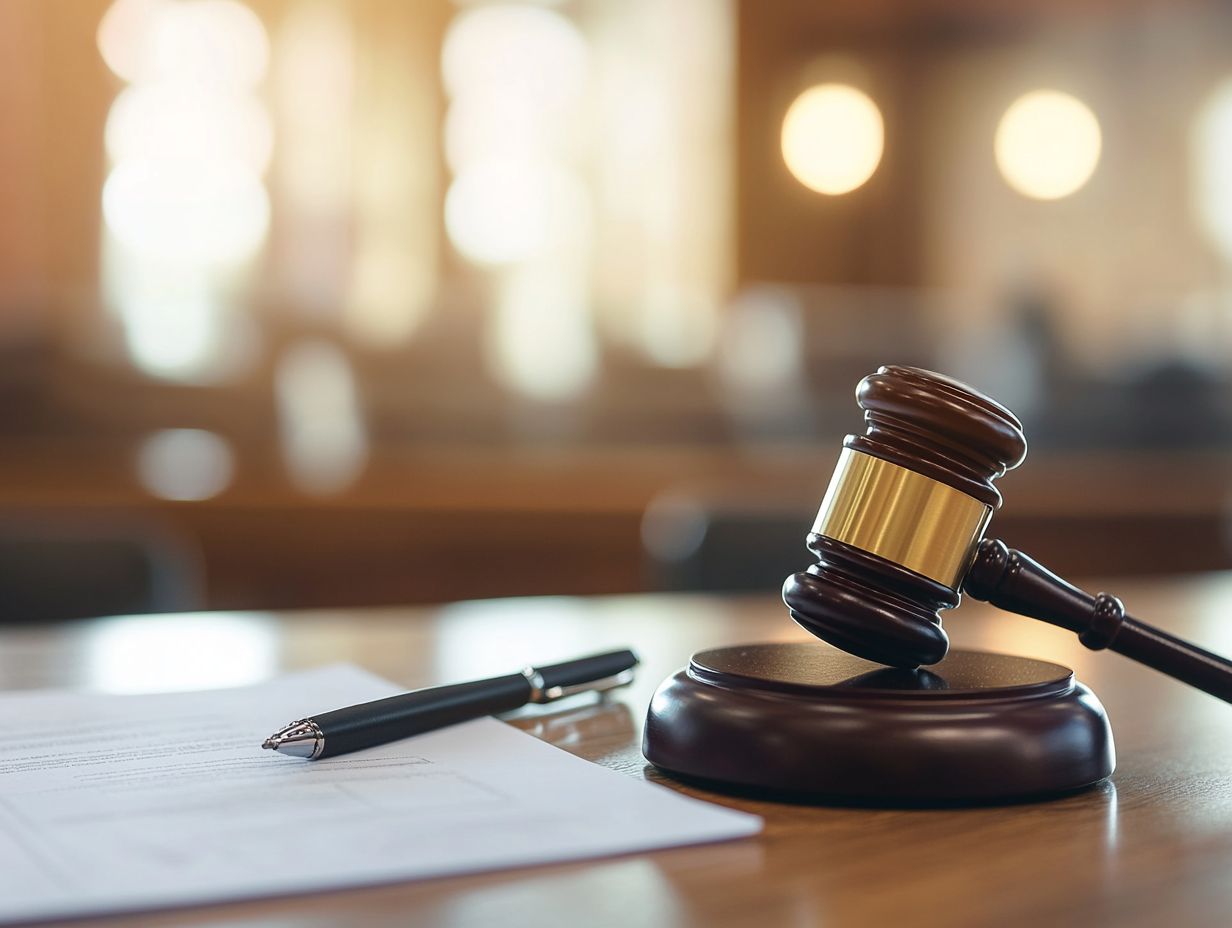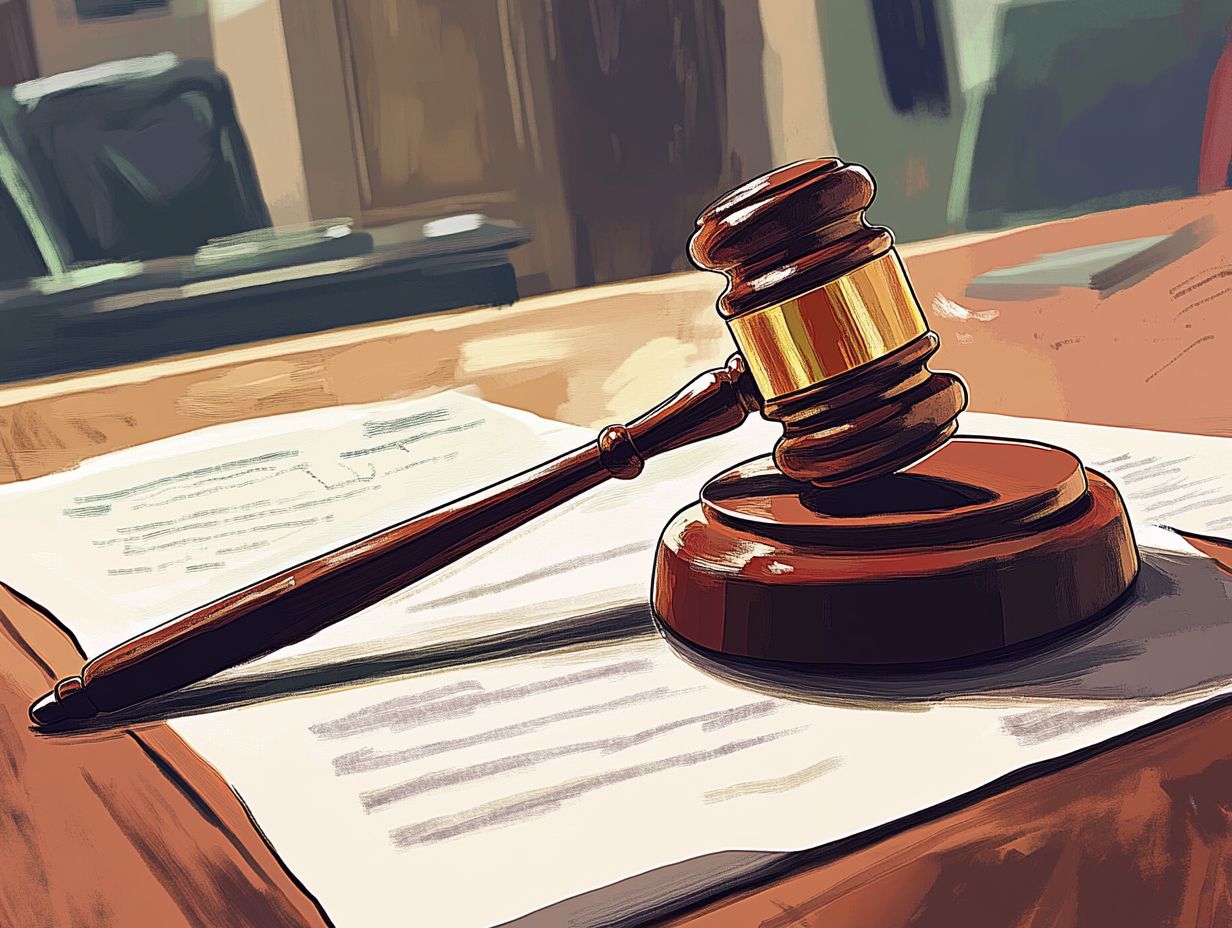How to Appeal a Conviction
Understanding the legal process after a conviction can feel overwhelming, but grasping the appeal process is essential for anyone seeking justice.
This guide outlines each step, from the aftermath of a conviction to the various reasons to challenge a conviction. You’ll discover how to file an appeal, prepare for hearings, and explore potential outcomes that may await you.
We also explore alternatives to appealing and share strategies for building a robust case. Whether you’re embroiled in a legal battle or just seeking knowledge, this guide offers valuable insights into the world of appeals.
Contents
- Key Takeaways:
- Understanding the Conviction Process
- Grounds for Appeal
- Steps to Appeal a Conviction
- Filing the Appeal
- Preparing for the Appeal Hearing
- Possible Outcomes of an Appeal
- Reversal, Retrial, or Upholding the Conviction
- Alternatives to Appealing
- Tips for a Successful Appeal
- Frequently Asked Questions
Key Takeaways:

- Understanding the conviction process is crucial in determining your appeal options.
- Filing an appeal requires a legal basis and following proper steps, such as preparing for the appeal hearing.
- If an appeal is unsuccessful, considering other legal options may still provide an opportunity for justice.
Understanding the Conviction Process
The conviction process is a vital component of the justice system. It encompasses a series of steps where you, as the defendant, confront charges stemming from a misdemeanor or felony.
This journey culminates in a trial overseen by a judge who ultimately renders a verdict. This verdict can significantly impact your criminal record and may be subject to scrutiny if any legal errors are discovered during the proceedings.
What Happens After a Conviction?
After a conviction, you ll face sentencing by the judge. This process varies based on the severity of the crime and your legal rights within the justice system.
During this phase, the judge weighs a range of factors, including the nature of the offense, any mitigating circumstances, and recommendations from probation officers. Sentencing can encompass fines, community service, probation, or incarceration.
Once the sentence is handed down, you have the right to appeal the conviction or the length of the sentence. This is an important step that could change everything for your future.
It s vital to recognize that a conviction leads to the creation of a criminal record, which can have lasting impacts on your employment prospects, housing options, and personal relationships. Having legal counsel by your side can be invaluable, guiding you through the complex post-conviction landscape and helping you explore possible avenues for expungement, which is the legal process of removing a conviction from your record, or clemency in the future.
Grounds for Appeal
The reasons to challenge a conviction can vary significantly, often depending on legal errors or insufficient evidence during the trial process. These factors create a foundation for you to challenge a conviction.
Legal Basis for Appealing a Conviction
The legal grounds for appealing a conviction often rest on substantial legal errors that may have occurred during the trial or misinterpretations of evidence. These errors can profoundly impact the outcome of a case.
For instance, if the jury received improper instructions regarding the law, or if pivotal evidence was unjustly excluded, such mistakes can undermine the trial’s integrity. Violations of your rights, such as inadequate legal representation or coerced confessions, can also lead to an unjust verdict.
By scrutinizing these elements, it becomes clear that appealing a conviction is not merely a procedural formality; it is a crucial measure in the pursuit of justice and fairness within the legal system.
Steps to Appeal a Conviction

The process of appealing a conviction involves several key steps that require your careful attention.
- First, you’ll need to file a Notice of Appeal.
- This is followed by the preparation of thorough legal documentation.
- Often, you’ll present an oral argument before an appellate court, where your attorney plays a pivotal role in the litigation.
Each step is essential, and having a skilled legal professional by your side can significantly impact the outcome of your appeal.
Filing the Appeal
Filing an appeal is an important first step in the appeal process. You need to submit a Notice of Appeal to the court, which officially starts the review of your case by appellate judges.
This action shows your intention to challenge the decision made by a lower court. It s essential to do this within a specific timeframe, usually between 30 and 90 days after the judgment.
Gathering key documents is crucial. You ll need the Notice of Appeal, relevant transcripts, and the trial court record to provide the appellate judges with all the necessary information.
Engaging an attorney is invaluable. They will guide you through the complexities of legal terms, help you meet important deadlines, and craft persuasive arguments that could sway the outcome of your appeal.
This foundational action can significantly impact the success or failure of your appeal.
Preparing for the Appeal Hearing
To prepare for your appeal hearing, you must craft compelling legal arguments and meticulously review the trial transcript. Ensure your attorney is fully equipped to present a strong case before the appellate court.
Your legal team needs to gather all relevant evidence, such as witness statements, expert testimonies, and documents that could support your argument.
Understanding legal precedents and relevant laws is essential. This helps formulate strategies that highlight weaknesses in the lower court s ruling and showcase the strengths of your position.
Thoroughly examining the trial transcript allows you to identify critical moments deserving closer examination or potential appeal. This preparation boosts your chances of success and instills confidence as you navigate the appellate process.
Possible Outcomes of an Appeal
When considering an appeal, you face various potential outcomes. One possibility is a reversal of the conviction, which could lead to a retrial and new opportunities for your case.
Alternatively, the original conviction might be upheld, with each scenario carrying substantial implications for your future and legal standing.
Reversal, Retrial, or Upholding the Conviction
When an appeal is decided, the appellate court can either reverse the conviction, leading to a retrial, or uphold the conviction, affirming the previous judgment.
This decisive moment can alter the course of justice in your case. A reversal often depends on discovering procedural errors, evidentiary issues, or fairness concerns surrounding your original trial.
If the court upholds the conviction, it means they found sufficient legal grounds to support the initial decision. Factors like the integrity of the jury’s verdict, the validity of evidence, and the effectiveness of your defense attorney are crucial in determining the outcome.
The implications for you can vary from the possibility of freedom and a fresh chance at justice if the conviction is reversed to the ongoing challenges of living with a criminal record if the conviction stands.
Alternatives to Appealing

There are alternatives to appealing a conviction within the justice system. These options present defendants with various legal pathways that may offer relief without the burden of a lengthy appeal process.
Exploring these alternatives can significantly shape your litigation strategies, allowing for more efficient and effective ways to pursue justice.
Don’t miss out on this opportunity! Contact a legal expert today to explore your options and take the next steps in your case.
Other Legal Options to Consider
You may want to explore various legal options beyond the traditional appeal process, such as plea deals, sentence modifications, or removing a criminal record. Each of these alternatives has the potential to reshape your legal journey.
Plea deals let you negotiate a reduced sentence or lesser charges in exchange for a guilty plea. This often leads to a more favorable outcome than an extensive trial.
Sentence modifications provide a way for you to request a reduction or alteration of your existing sentence based on new evidence or changed circumstances. This gives hope to those seeking a second chance.
Removing a criminal record can enhance your prospects for employment and housing once certain conditions are fulfilled.
Each of these options has its advantages and considerations, making it crucial for you to weigh them carefully against the appellate route. The appeals process can be lengthy and uncertain, demanding legal expertise and often resulting in complex procedural challenges.
Tips for a Successful Appeal
For a successful appeal, it s essential for you to adopt effective strategies, work closely with an experienced attorney, and craft compelling legal arguments that resonate with the appellate judges reviewing your case.
Strategies for a Strong Case
Building a strong case for appeal demands meticulous attention to detail. This includes gathering compelling evidence, crafting persuasive legal arguments, and collaborating closely with your attorney throughout the process.
To navigate the complexities of the appellate system, you must conduct a thorough assessment of the original trial s proceedings. This means spotting any mistakes that could change your outcome and ensuring these points are clearly articulated in your appeal submission.
The importance of credible evidence cannot be overstated; it forms the bedrock of the legal arguments you present. Appellate courts place great emphasis on solid documentation, such as transcripts and witness statements, which can significantly influence their decisions.
By focusing on and implementing these key strategies, you can greatly enhance your chances of achieving a favorable outcome in your appeal.
Frequently Asked Questions
1. What does it mean to appeal a conviction?

Appealing a conviction means challenging a court’s decision and asking a higher court to review the case. It is a legal process that allows a convicted individual to seek a new trial or have their sentence reduced or overturned.
2. Can anyone appeal a conviction?
Yes, anyone who has been convicted of a crime has the right to appeal the decision. This includes both the defendant and the prosecution.
3. What are the grounds for appealing a conviction?
The grounds for appealing a conviction may vary depending on the jurisdiction. Generally, they can be based on errors made during the trial, new evidence, or constitutional violations.
4. How do I begin the process of appealing a conviction?
The first step to appealing a conviction is to file a notice of appeal with the court that issued the conviction. This must be done within a specified time frame, usually 30 days after the conviction.
5. Do I need a lawyer to appeal a conviction?
While it is not required to have a lawyer for an appeal, it is highly recommended. The appeal process can be complex, and having a lawyer with experience in criminal appeals can greatly increase your chances of success.
6. What happens if my appeal is successful?
If your appeal is successful, the conviction may be reversed or a new trial may be granted. The court may also reduce your sentence or dismiss certain charges. It is important to note that not all appeals result in the conviction being overturned.






